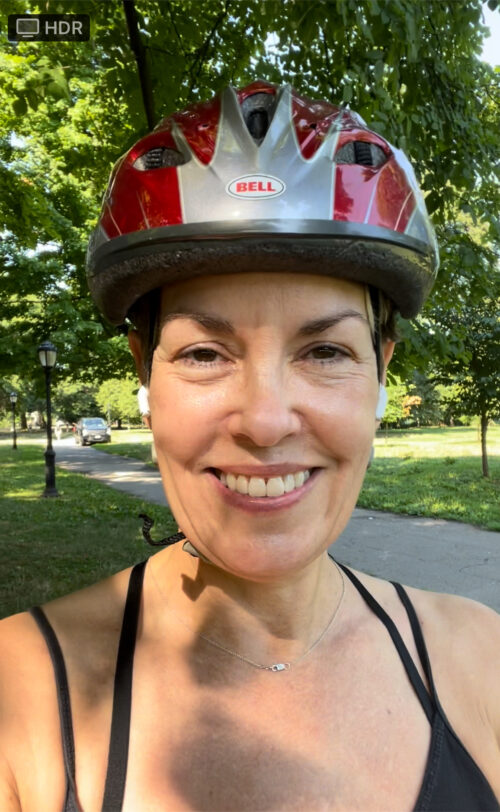I enjoy riding my 10-speed mountain bike around the loop in Prospect Park when the weather permits. There’s a stretch of road about a half mile long on the East side of the loop that incrementally slopes upwards as I pedal north. It’s an almost imperceptible incline, but I can really feel how much more difficult it is to pedal, especially as I’m not riding an electric bicycle!
As I approach the incline, I know to downshift my gears repeatedly so that the pedaling gets easier. It doesn’t take long for me to be at the lowest gear, pedaling very fast, even as I’m barely moving up the hill. Sometimes joggers pass me, I’m going so slow. BUT! I’ve learned that by pedaling at the lowest gear, keeping my head down, telling myself it will be over soon, and breathing deeply and intentionally, it doesn’t take long before I reach the top of the hill and can cruise effortlessly from there on.
The other day, as I was pedaling madly up the hill, it occurred to me that life is a lot like riding a bike. Sometimes we face uphill challenges that are very difficult, and sometimes, we cruise through the days, with the wind at our back.
But how many of us think about changing gears to better handle the ups and downs of life, like we instinctively change gears when riding a bike? How many of us use bona fide coping skills for life’s ups and downs?
Oftentimes, when life gets hard, I do the exact opposite of downshifting! Rather than acknowledge the difficulty I’m having with a task, person, or situation and being kind to myself, I instead beat myself up for having a hard time. Rather than recognizing that I’m in an uphill battle and reassessing my reaction, I wonder, “what’s wrong with me?!” for not being better at dealing with the situation.
I work against myself when life gets hard, rather than with myself. I don’t downshift gears to make it easier to manage the uphill battle. I push myself harder and sometimes even punish myself when I don’t succeed! In psychology, we call these maladaptive coping skills.
And then, I believe I’m wrong or not enough, so I better try even harder and beat myself up even more next time.
Sometimes, it works in the opposite direction. Sometimes, when facing an uphill battle, I blame the hill for making it hard. I put a lot of energy and focus into how unfair it is that I have to go up this hill! I get all worked up that this hill is on my path. After all, it would be so much more to my liking if the hill wasn’t there at all. I might spend time scheming and solving how to get rid of the hill, or I might go this way and that, trying to find another way that doesn’t involve having to go up the hill. The hill becomes an intense obstacle in my path.
Rather than face the hill, downshift my gears, work with myself and with the path in front of me to get to the top with more ease, I get angry and resentful. I complain and vent. I try to avoid or control the presence of the hill because it’s hard and I don’t like it. I expend valuable energy that could otherwise go towards accepting the challenge and downshifting myself to better deal with it. Again, maladaptive coping skills prevail.
And then, I believe life is unfair or too much, so I better stay hypervigilant and complain even louder next time.
Self-blame: “I’m bad” or Victimhood: “others are bad” – are two very common maladaptive coping skills we employ to deal with life’s ups and downs. Instead of contextualizing the circumstances – “Oh, here’s an uphill battle!” – and then working with ourselves and with life to manage it in the best way (using adaptive coping skills), we make it harder for ourselves (maladaptive coping).
We do this for all kinds of reasons, but the simplest way to make sense of it is to chalk it up to habit. We humans are incredibly good at developing automatic patterns of relating to ourselves and life, coping skills to keep ourselves comfortable and safe, that become habitual over time.
In childhood, we have very limited resources and power, like riding a single-speed, fixed-gear bike. Blaming ourselves or blaming others is a very effective way of coping. In adulthood, we have way more resources and personal power to deal with adversity in more adaptive ways. Like riding a 10 speed bike, with practice we can learn to shift gears depending on the road, and enjoy the ride no matter what’s around the corner. In other words, we can develop more adaptive coping skills for life’s ups and downs.
We all know that it is difficult to break our habits, but it certainly isn’t impossible. If you’re ready to trade in your fixed-gear, single-speed bike for a 10-speed, so you can navigate the ups and downs of life with more ease and grace, reach out to Sentient today and let’s get started.

